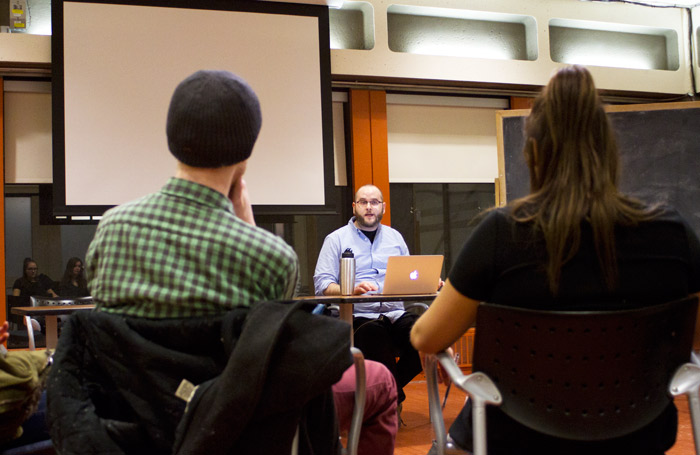McGill Against Austerity continued its series of workshops on Feb. 17 with a presentation entitled “Protesting, Police, and Knowing Your Rights,” given by civil lawyer Max Silverman. A former McGill student, Silverman currently practices with law firm Avocat Montreal and teaches at Concordia University. He talked about the history of law enforcement in Montreal and gave advice for interacting with the police.
A history of cycles
Silverman spoke critically of Montreal’s police force, which he characterized as having cycles of escalation in brutality.
“The history of the Montreal police is basically a history of violence and corruption building up to the point where the public doesn’t take it anymore,” Silverman said. “The city intervenes, restructures the police force, says all the problems are solved and so begins the forty to fifty year cycle.”
Although Silverman applauded the Quebec Superior Court’s decision to remove Highway Safety Code 500.1 and bylaw P-6, laws which had been used against protesters, he stated that the swift police response to the protests held in Spring 2015 was evidence of the cycle of escalation.
“[In Spring 2015] instead of the mass arrests and focusing on giving out as many tickets as possible, the focus was really on violence and weapons,” Silverman said. “The net result of these tactics was that hardly any protests lasted more than an hour and no protests lasted more than two hours.”
Interacting with police
Silverman sought to advise student activists by giving an account of a citizen’s civil rights.
“The police do not have the right to stop and identify people for no reason in this country, despite what they think and how they act,” Silverman said.
In advising the distinction between being questioned and being arrested, Silverman emphasized that the only obligation an individual has when being questioned is identifying yourself if you’ve been pulled over driving, are in a an age-restricted area, in certain parts of the city at night, or are using a reduced fare transit card.
“The general advice that we give in such a situation is that if the police stop you and try to talk to you, you ask them calmly and clearly if you’re under arrest,” Silverman said. “If they say no, then you absolutely have the right to say I’m not going to talk to you and leave.”
The need for protesting
With the increasing use of force in 2015, Silverman suggested that social movements might need to re-evaluate how they approach protesting.
“There was a time when getting arrested was the point, when getting arrested served a purpose,” Silverman said. “In our modern times with nastier police tactics, with nastier fines, with mandatory minimums in jail, there are many reasons why people have moved away from that.”
Silverman upheld that society has a need for the right to protest.
“I think that things change when people make them change,” Silverman said. “In particular, [for] people concerned about political oppression and [barriers to] protesting […] I do think the best way to counter [these issues] is to just get out and protest more.”
McGill Against Austerity organizer Christian Scott stated that he found the workshop informative.
“Protesting is our right, it’s always good to know what our rights and obligations are,” Scott said. “Keep protesting, there’s always something to change.”
Although students largely agreed that police brutality is a concern, many did not feel convinced about the merits of protesting as a method.
“These protests generally lack clearly defined goals, so they are not likely to do much,” Griffin Smith, U0 Arts, said. “Frankly, I have more important things to do.”








